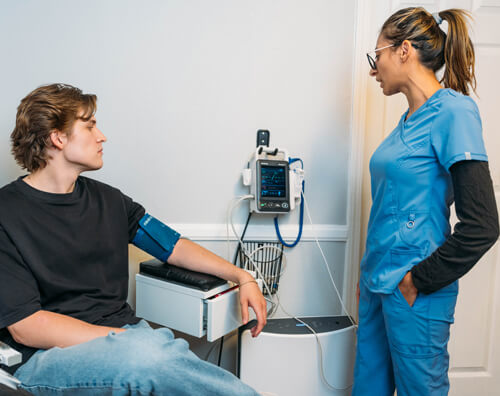What Medications Are Used for Medical Addiction Detox Programs?
The type of medication used during a medical detox program varies depending on the substance involved and the severity of your addiction. The goal is to minimize withdrawal symptoms, ensure comfort, and provide a safer detox experience. Here’s a breakdown of the commonly used medications for different substances.
Medication for Opioid Detoxification
Opioid detoxification can be challenging due to the physical and psychological withdrawal symptoms. To ease this process and reduce the risk of relapse, medical professionals may use specific medications. These medications stabilize the brain’s response to opioids and minimize cravings, allowing you to progress to subsequent recovery stages safely.
- Methadone: A long-acting opioid agonist, methadone reduces cravings and withdrawal symptoms by stabilizing the brain’s response to opioids. Administered under medical supervision, it allows for a gradual tapering process and prepares you for further treatment.
- Buprenorphine: This partial opioid agonist provides relief from cravings and withdrawal symptoms. By stimulating the brain’s opioid receptors to a lesser degree than full agonists, buprenorphine minimizes the potential for misuse and is often used in combination with naloxone.
- Naltrexone: Naltrexone is an opioid antagonist that blocks the effects of opioids, helping to reduce the risk of relapse. It can be taken orally or administered via a long-acting injection for sustained protection.
Medication for Alcohol Detoxification
Alcohol detoxification requires a carefully monitored approach due to the potential severity of withdrawal symptoms. Medical supervision and targeted medications play a critical role in reducing cravings, managing anxiety, and preventing seizures. With the right medication, your body can gradually adapt to a life free from alcohol dependence.
- Benzodiazepines (e.g., diazepam, lorazepam): Benzodiazepines are frequently prescribed to manage acute withdrawal symptoms, such as anxiety, agitation, and seizures, during alcohol detoxification. Their calming effect eases your transition to sobriety.
- Acamprosate: This medication helps normalize the brain’s chemical balance disrupted by long-term alcohol use, reducing cravings and supporting you through recovery after detox.
- Antabuse (disulfiram): By inhibiting the enzyme that breaks down alcohol in your body, disulfiram causes a severe aversive reaction when alcohol is consumed. The resulting nausea and other unpleasant effects act as a deterrent against relapse.
Medication for Benzodiazepine Detoxification
Benzodiazepine detoxification involves a delicate process because sudden withdrawal can result in severe symptoms. To ensure a safer and smoother transition, medical professionals use a tapering strategy, reducing the dosage gradually. Longer-acting benzodiazepines can also provide greater stability during this controlled withdrawal process.
- Tapering Under Medical Supervision: A gradual reduction in benzodiazepine dosage under careful medical supervision is crucial for minimizing withdrawal symptoms and avoiding severe side effects.
- Longer-Acting Benzodiazepines: In some cases, substituting shorter-acting benzodiazepines with longer-acting ones provides greater stability and a safer, controlled reduction process.
Medication for Stimulant Detoxification (e.g., Cocaine, Methamphetamine)
Detoxifying from stimulants such as cocaine and methamphetamine requires comprehensive supportive care. While no FDA-approved specific medications exist for stimulant detox, symptomatic treatment helps address anxiety, depression, and insomnia. Behavioral therapy, holistic strategies, and nutritional support are also integral to managing the challenging withdrawal phase. Treatment includes:
- Symptomatic Treatment: Managing anxiety, depression, insomnia, and other withdrawal symptoms through medication and therapy.
- Behavioral Therapy: Cognitive behavioral therapy (CBT) and other approaches address the underlying psychological factors of addiction.
- Nutritional Support and Holistic Strategies: Providing balanced nutrition and wellness practices to help you regain physical and emotional stability.









